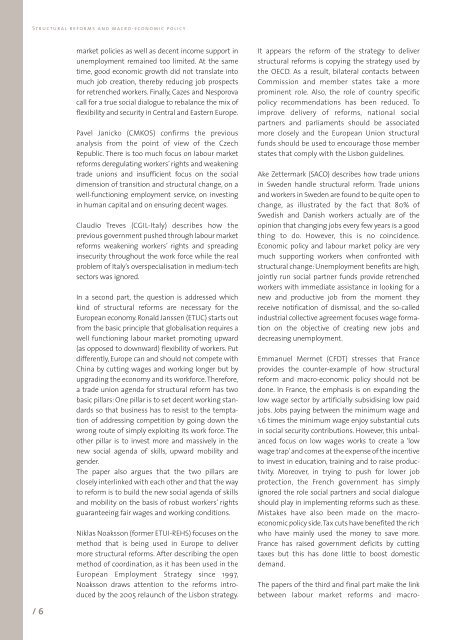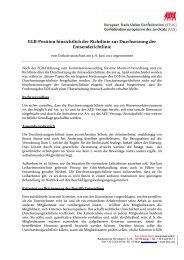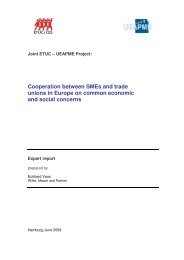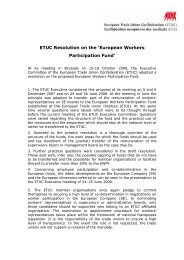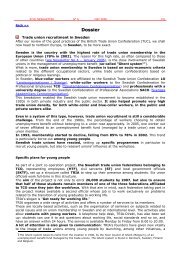Structural reforms and macro-economic policy - ETUC
Structural reforms and macro-economic policy - ETUC
Structural reforms and macro-economic policy - ETUC
You also want an ePaper? Increase the reach of your titles
YUMPU automatically turns print PDFs into web optimized ePapers that Google loves.
<strong>Structural</strong> <strong>reforms</strong> <strong>and</strong> <strong>macro</strong>-<strong>economic</strong> <strong>policy</strong><br />
/ 6<br />
market policies as well as decent income support in<br />
unemployment remained too limited. At the same<br />
time, good <strong>economic</strong> growth did not translate into<br />
much job creation, thereby reducing job prospects<br />
for retrenched workers. Finally, Cazes <strong>and</strong> Nesporova<br />
call for a true social dialogue to rebalance the mix of<br />
flexibility <strong>and</strong> security in Central <strong>and</strong> Eastern Europe.<br />
Pavel Janicko (CMKOS) confirms the previous<br />
analysis from the point of view of the Czech<br />
Republic. There is too much focus on labour market<br />
<strong>reforms</strong> deregulating workers’ rights <strong>and</strong> weakening<br />
trade unions <strong>and</strong> insufficient focus on the social<br />
dimension of transition <strong>and</strong> structural change, on a<br />
well-functioning employment service, on investing<br />
in human capital <strong>and</strong> on ensuring decent wages.<br />
Claudio Treves (CGIL-Italy) describes how the<br />
previous government pushed through labour market<br />
<strong>reforms</strong> weakening workers’ rights <strong>and</strong> spreading<br />
insecurity throughout the work force while the real<br />
problem of Italy’s overspecialisation in medium-tech<br />
sectors was ignored.<br />
In a second part, the question is addressed which<br />
kind of structural <strong>reforms</strong> are necessary for the<br />
European economy. Ronald Janssen (<strong>ETUC</strong>) starts out<br />
from the basic principle that globalisation requires a<br />
well functioning labour market promoting upward<br />
(as opposed to downward) flexibility of workers. Put<br />
differently, Europe can <strong>and</strong> should not compete with<br />
China by cutting wages <strong>and</strong> working longer but by<br />
upgrading the economy <strong>and</strong> its workforce.Therefore,<br />
a trade union agenda for structural reform has two<br />
basic pillars: One pillar is to set decent working st<strong>and</strong>ards<br />
so that business has to resist to the temptation<br />
of addressing competition by going down the<br />
wrong route of simply exploiting its work force. The<br />
other pillar is to invest more <strong>and</strong> massively in the<br />
new social agenda of skills, upward mobility <strong>and</strong><br />
gender.<br />
The paper also argues that the two pillars are<br />
closely interlinked with each other <strong>and</strong> that the way<br />
to reform is to build the new social agenda of skills<br />
<strong>and</strong> mobility on the basis of robust workers’ rights<br />
guaranteeing fair wages <strong>and</strong> working conditions.<br />
Niklas Noaksson (former ETUI-REHS) focuses on the<br />
method that is being used in Europe to deliver<br />
more structural <strong>reforms</strong>. After describing the open<br />
method of coordination, as it has been used in the<br />
European Employment Strategy since 1997,<br />
Noaksson draws attention to the <strong>reforms</strong> introduced<br />
by the 2005 relaunch of the Lisbon strategy.<br />
It appears the reform of the strategy to deliver<br />
structural <strong>reforms</strong> is copying the strategy used by<br />
the OECD. As a result, bilateral contacts between<br />
Commission <strong>and</strong> member states take a more<br />
prominent role. Also, the role of country specific<br />
<strong>policy</strong> recommendations has been reduced. To<br />
improve delivery of <strong>reforms</strong>, national social<br />
partners <strong>and</strong> parliaments should be associated<br />
more closely <strong>and</strong> the European Union structural<br />
funds should be used to encourage those member<br />
states that comply with the Lisbon guidelines.<br />
Ake Zettermark (SACO) describes how trade unions<br />
in Sweden h<strong>and</strong>le structural reform. Trade unions<br />
<strong>and</strong> workers in Sweden are found to be quite open to<br />
change, as illustrated by the fact that 80% of<br />
Swedish <strong>and</strong> Danish workers actually are of the<br />
opinion that changing jobs every few years is a good<br />
thing to do. However, this is no coincidence.<br />
Economic <strong>policy</strong> <strong>and</strong> labour market <strong>policy</strong> are very<br />
much supporting workers when confronted with<br />
structural change: Unemployment benefits are high,<br />
jointly run social partner funds provide retrenched<br />
workers with immediate assistance in looking for a<br />
new <strong>and</strong> productive job from the moment they<br />
receive notification of dismissal, <strong>and</strong> the so-called<br />
industrial collective agreement focuses wage formation<br />
on the objective of creating new jobs <strong>and</strong><br />
decreasing unemployment.<br />
Emmanuel Mermet (CFDT) stresses that France<br />
provides the counter-example of how structural<br />
reform <strong>and</strong> <strong>macro</strong>-<strong>economic</strong> <strong>policy</strong> should not be<br />
done. In France, the emphasis is on exp<strong>and</strong>ing the<br />
low wage sector by artificially subsidising low paid<br />
jobs. Jobs paying between the minimum wage <strong>and</strong><br />
1.6 times the minimum wage enjoy substantial cuts<br />
in social security contributions. However, this unbalanced<br />
focus on low wages works to create a ‘low<br />
wage trap’<strong>and</strong> comes at the expense of the incentive<br />
to invest in education, training <strong>and</strong> to raise productivity.<br />
Moreover, in trying to push for lower job<br />
protection, the French government has simply<br />
ignored the role social partners <strong>and</strong> social dialogue<br />
should play in implementing <strong>reforms</strong> such as these.<br />
Mistakes have also been made on the <strong>macro</strong><strong>economic</strong><br />
<strong>policy</strong> side.Tax cuts have benefited the rich<br />
who have mainly used the money to save more.<br />
France has raised government deficits by cutting<br />
taxes but this has done little to boost domestic<br />
dem<strong>and</strong>.<br />
The papers of the third <strong>and</strong> final part make the link<br />
between labour market <strong>reforms</strong> <strong>and</strong> <strong>macro</strong>-


